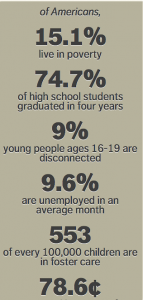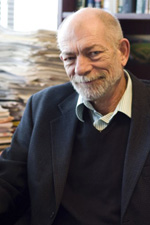Catholic social teaching's influence on various organizations.
public policy

For USA Today, Jonathan Merrit examines the changing nature of "Christian civic engagement":
Christian Millennials are now coming of age and recognizing the flawed strategies and broken agendas embraced by their forebears. They've seen how the religious right (and the religious left, for that matter) has used the Bible as a tool to gain political power and reduced the Christian community to little more than a voting bloc — and they are forging a different path.
Read the full article here

My pastor and I have a friendly tiff going on. He says that Jesus was strictly a-political; therefore Christians should abstain from politics completely. I say that Jesus challenged violent, poverty-inducing, socio-political structures throughout his life and ministry; therefore Christians have a duty to advocate for peace and to speak out for the poor and the oppressed. Both of us are hardheaded, and neither of us cedes much in our debates, but we always walk away as friends, because at the end of the day there’s a key component to the discussion that we both agree on: The Bible is not a public policy manual!

Perhaps the most important finding from the report is that we have both the experience and the policy tools necessary to cut poverty in half.
Between 1964 and 1973, under both Democratic and Republican administrations, the U.S. poverty rate fell by nearly half (43 percent) as a strong economy and effective public policy initiatives expanded the middle class.
Similarly, between 1993 and 2000, shared economic growth combined with policy interventions such as an enhanced earned income tax credit and minimum wage increase worked together to cut child poverty from 23 percent to 16 percent.
We can't do this alone.
 My office has two overflowing bookshelves, with more books stacked on top and on the windowsill. But above my desk within easy reach is a small shelf. On it I keep those books I most regularly use in thinking and writing. Here are the top 10.
My office has two overflowing bookshelves, with more books stacked on top and on the windowsill. But above my desk within easy reach is a small shelf. On it I keep those books I most regularly use in thinking and writing. Here are the top 10.
1. The Bible: What can I say about the foundational source of God's guidance in everything? I read or refer to it nearly every day. It was given to us "for teaching, for reproof, for correction, and for training in righteousness" (2 Timothy 3:16).
2. The Book of Common Prayer: I am not Anglican/Episcopalian, but there is something in the formal prayers of the traditional liturgy that resonate with my soul. On those days I really don't feel like praying or can't find the words, it's comforting to have a place to turn for inspiration.
We are looking for 1,000 pastors to debunk a myth based on the political assertion that government doesn't have any responsibility to poor people. The myth is that churches and charities alone could take care of the problems of poverty -- especially if we slashed people's taxes. Both this assertion and myth contradict the biblical imperative to hold societies and rulers responsible for how they treat the poor, and ignore the Christian tradition of holding governments accountable to those in need. Faith-based organizations and government have had effective and healthy partnerships, and ultimately, the assertion and myth have more to do with libertarian political ideology, than good theology.
I arrived in the faith-based advocacy community in Washington, D.C. fresh out of divinity school.
Certain moments in our nation's history have consistently opened the door for the least civil voices to enact evil through civil policy: think the institution of race-based U.S. slavery, the Indian removals, Jim Crow laws, legalized segregation, the federal protection of lynching mobs, and, don't forget, the Japanese internment camps, among others.